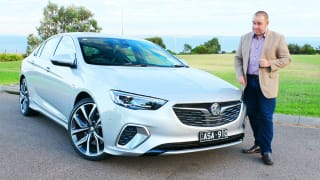
Holden Commodore 2018 review
The new ZB Holden is a whole lot more Commodore than you may realise. Whether it lives up to its reputation is another matter.
Browse over 9,000 car reviews
I’m not often wrong, but when I am, I’m normally very wrong... but it’s mainly because I haven’t been properly informed. Like when during a CarsGuide podcast I called the Kia Stinger the Kia Stinker but hadn’t even driven it yet. You see, I didn’t want to like the Kia Stinger. Everybody was raving about how amazing this rear-wheel drive sedan was and, well, I was still getting over the loss of Australia’s homegrown rear-wheel drive sedans.
Which is probably why my editor was grinning when he passed me the keys to the Kia Stinger 200S and asked for a review.
So here is a review for you on the 200S and a lesson for me on not shooting my mouth off until I know what I’m talking about.
| Kia Stinger 2017: 200S | |
|---|---|
| Safety rating | |
| Engine Type | 2.0L turbo |
| Fuel Type | Regular Unleaded Petrol |
| Fuel Efficiency | 8.8L/100km |
| Seating | 5 seats |
| Price from | $24,640 |
People on the footpath would gawk as I drove past them and I could tell they had no idea what they were looking at but thought it was something special. Its giant air intakes, bonnet nostrils, side vents, the roof line which juts into the windscreen, the fastback profile, the quad exhaust and tail-lights which streak down the side of the car make the Stinger look fast, angry, powerful and prestigious.
In the words of my wife: “It looks like a supercar”.
The Stinger is a large car, but its dimensions show it to be more diminutive than the Aussie Commodore at 4830mm long, 1870mm wide and 1400mm tall.

The S and the Si are almost identical looking – the only main difference being is the Si has a sunroof. The GT is noticeably different with larger wheels, LED headlights, and cosmetic improvements such as body coloured door handles and a fancier grille.
The S’s cabin feels snug, not in a cramped way but in the sense that the dash, doors and seats appear to curl around you. While other car companies are all about textured layers in their cockpits, the Kia’s innards are smooth, curved and minimal, with the use of dark materials. It’s a design style that Kia has used for years but I haven’t seen it executed as well in anything as it is in the Stinger.
It’s not as elegant and prestigious as, say, a Jaguar XF, and I do reckon the look is beginning to date, but the fit and finish feels excellent.

The Stinger’s 2905mm wheelbase is only a thumb’s width less than the length of the previous Commodore’s, despite the overall length being shorter - and that means legroom in the back seat is excellent. I’m 191cm tall and I have about 30mm of air between my knees and the driver’s seat when it’s set in my position.
Headroom in the back is fine, but only just – that fastback roofline means the ceiling height is getting low.
Boot space is good at 406 litres.
Cabin storage is good – there are four cupholders (two in the back and two up front), bottle holders in all the doors, plus a long and wide centre console bin.
Boot space is good at 406 litres (VDA), but not 625 litres-Skoda-Superb-good.
The 200S is the most affordable Stinger in the entire range at $45,990. That means one way or another you get less of the things the others have – less power because it’s a four-cylinder (there’s also a V6 in the S grade) and less features because the S is the entry spec into the model.
Coming standard is a 7.0-inch screen (the other grades get an 8.0-inch), there’s Apple CarPlay and Android Auto, proximity key, sat nav, six-speaker stereo, dual-zone climate control, eight-way power adjustable front seats, paddle shifters, quad exhaust and 18-inch alloy wheels. The seats are cloth – the other grades get leather – and the safety equipment list is lacking the advanced safety features of the higher specs, but you can read about that further down.
You could look at the price tag from a couple of perspectives – either see it as a pricey Kia or a fairly affordable large and powerful sedan compared to the all-wheel drive Volkswagen Arteon, which only comes in the top spec grade at $65,490.
Potential cross-shopping options include the $50,990 all-wheel drive Skoda Superb 206 TSI or its smaller Octavia RS stablemate (from $41,390 in auto). The Hyundai Sonata Premium for $45,490 would be the best match for the size, price and power, or the Kia Optima GT, the Stinger's smaller sibling ($44,490). The 2018 Commodore will come with a turbo four and a very similar output to the Stinger 200S, but it will be front-wheel drive.
As for rear-wheel drive large car rivals at this price point, there aren’t any since the Aussie-made Commodore and Falcon were discontinued. Sure there is the Hyundai Genesis, but that starts at $61,500 and it's also a bit bigger.
I won’t go on about it, but in January this year a 304kW V8 Commodore SS-V was $48,490. Just saying.
The 200S has the smaller of the two engines available in the Stinger – it’s the 2.0-litre four-cylinder turbo petrol (the other is a V6 petrol). I went from ‘meh’ to ‘yeah’ on the first reasonable stretch of road I encountered – the output is excellent at 182kW and 353Nm.

A smooth-as eight-speed automatic shifts gears, with no manual option available.
Unlike most performance and prestige cars the Stinger is happy with regular unleaded petrol and Kia says it will only use 8.8L/100km after a combination of urban and open roads. After a week of commutes into Sydney’s CBD and our 150km national park test loop the trip computer in our 200S had recorded an average of spot-on 10.0L/100km. I’m happy with any fuel consumption figure I achieve that’s within 1.5L/100km of the manufacturer’s serving suggestion.
I didn’t want to like the Kia Stinger and I wanted to not like the four-cylinder version even more. I started to change my mind when I first saw it waiting in our car park – frankly it’s stunning but then again all Kias are sexy now, (yes, even the Kia Carnival) and it would have to drive as well as it looks for me to be happy.
I was ready for a four-cylinder Mustang experience where the engine just doesn’t match the metal, a high-powered small engine in my opinion is best in a small hatch, well that’s how I felt before I drove the Stinger 200S.

The straight-line shove and urge from that 2.0-litre engine is eye-opening and, rather than feeling as big and heavy as it looks, the Stinger is light and pointable. I’d only been in the car 15 minutes and was already dreading the conversation I’d have to have back in the office where I’d made it very clear that I felt the ‘g’ in Stinger was a typo and it should have been a ‘k’. That was before I before I drove the thing.
A trip to the national park for more challenging roads just cemented that initial impression that this was a responsive beast and fun to steer with the familiar rear-wheel drive feel of the Aussie Falcons and Commodores.
Those Continental tyres are hard-walled and fairly low profile which will mean you’ll feel every crack in the road, but the suspension is soft. A drawback with that is a bit of a brittle ride on poor surfaces and that softer suspension can lead to some floaty bounce over bumps when you want to be more planted in the bends. There was some body roll and tyre squealing in the corners even when I wasn’t pushing it.

Rear visibility is horrendous, the angle of the fastback window distorts the image severely – the reversing camera picture is good, and you can even switch to the rear view while moving forward.
Overall, though, the driving experience matches the look, that engine is powerful and responsive, the balance feels great, the handling is good and there’s decent feedback through that well-weighted and accurate steering.
And this is the base-spec 200S. I've since driven the V6-powered GT and on initial impression if you’re not fussed overly with performance then I reckon you’d be content with the four-cylinder.
Basic Warranty
7 years / unlimited km warranty
ANCAP Safety Rating

The Stinger is yet to be given an ANCAP safety rating, but that’s normal with cars that haven’t been out for long and we expected to see a good result soon. A drawback to the base grade 200S is the lack of advanced safety equipment. There’s no auto emergency braking (AEB) or lane-keeping assistance on this grade. Also, a temporary spare wheel isn’t good enough in Australia where travelling distances are vast.
I also found the halogen headlights to be a bit dim on my night drive through the national park – the LED versions in the top spec GT are excellent, however.
The Stinger is covered by Kia's seven-year/unlimited km warranty. Servicing is recommended every 12 months or 10,000km, and visits are capped at $249 for the first service, $434 for the second, $317 for the third, $617 for the next, then $281, $562 and $696 for the seventh.
I’m making an official apology: the Kia Stinger is not the Kia Stinker. Even at the basement level of the Stinger line-up the 200S is impressive to drive and stunning looking inside and out. But I do think it’s ordinary that AEB and other safety equipment aren’t available at this level and for this price.
| Vehicle | Specs | Price* | |
|---|---|---|---|
| 330S | 3.3L, ULP, 8 SP AUTO | $33,550 – 39,930 | 2017 Kia Stinger 2017 330S Pricing and Specs |
| 200S | 2.0L, ULP, 8 SP AUTO | $24,640 – 30,470 | 2017 Kia Stinger 2017 200S Pricing and Specs |
| 330SI | 3.3L, ULP, 8 SP AUTO | $38,830 – 45,650 | 2017 Kia Stinger 2017 330SI Pricing and Specs |
| GT-Line (red Leather) | 2.0L, ULP, 8 SP AUTO | $30,800 – 37,070 | 2017 Kia Stinger 2017 GT-Line (red Leather) Pricing and Specs |
| Design | 9 |
|---|---|
| Practicality | 8 |
| Price and features | 7 |
| Under the bonnet | 8 |
| Efficiency | 8 |
| Driving | 8 |
| Safety | 6 |
| Ownership | 9 |
$24,640
Lowest price, based on third party pricing data